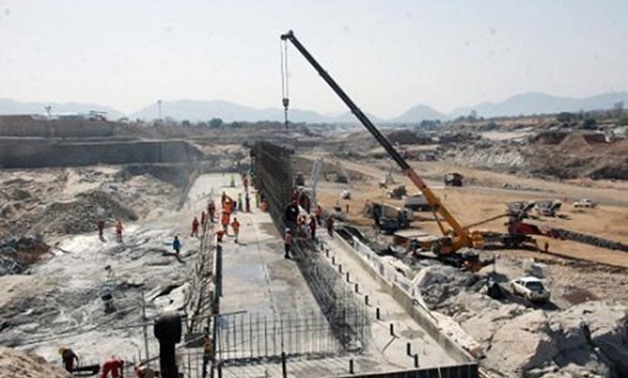
Grand Ethiopian Renaissance Dam construction (Photo: Reuters)
CAIRO – 25 September 2018: Minister of Water Resources and Irrigation Mohamed Abdel Ati headed to Ethiopia Tuesday to attend a trilateral meeting between Egyptian, Sudanese and Ethiopian irrigation ministers, according to a statement issued by the ministry.
The statement reported that the meeting comes upon an invitation from Ethiopian irrigation minister; the meeting will tackle technical issues of the Grand Ethiopian Renaissance Dam (GERD).
For his side, Abdel Ati stressed the importance of the meeting which has been agreed to “continue implementing the outcomes of the Addis Ababa-held Egyptian-Sudanese-Ethiopian tripartite summit on the Renaissance Dam to carry out the Declaration of the Renaissance Dam Principles Charter that was signed on March 23, 2015 in Khartoum,” according to President Abdel Fatah al- Sisi in a joint press conference with Sudanese President Omar al-Bashir in March.
After the meeting, the irrigation minster will head to Uganda to participate in the meeting on the flood risks projects; the visit comes within the framework of the cooperation between Egypt and Uganda in the field of water resources management and irrigation.
Egypt voiced its concern over Ethiopia’s dam construction, as it would affect Egypt’s 55 billion cubic meter share of the Nile water. However, Addis Ababa sees the dam is necessary for its development and will not negatively affect the downstream countries (Egypt and Sudan).
Egypt suffers from a water deficit of 30 billion cubic meters; it annually needs at least 90 billion cubic meters of water to cover 90 million citizens’ needs. However, it currently has only 60 billion cubic meters, of which 55.5 billion cubic meters come from the Nile and just 5 billion cubic meters come from non-renewable subterranean water in the deserts.
Further decrease in Egypt's water resources is expected amid the construction of the Grand Ethiopian Renaissance Dam (GERD), which could have a negative impact on Egypt’s Nile water share.
Despite the latest negotiations between Ethiopia, Egypt and Sudan to resolve the technical issues of the dam, Egypt is keen to look for new sources of water and to rationalize its usage to overcome any water scarcity problems in the future.
Agriculture in Egypt depends heavily on the Nile River, and it consumes 84 percent of Egypt’s water resources; therefore, the state is working on maintaining the country's water security through taking procedures that may help rationalize the use of water.
The government aimed to rationalize water consumption through preventing the cultivation of crops that need large amounts of water.
Minister of Irrigation and Water Resources Abdel Ati decided to reduce the rice agriculture area in Egypt from 1,700,000 feddans to 724,200 feddans (1 feddan = 1.038 acres).
According to the ministry, this decline will save 3 billion cubic meters of water. Simultaneously, the ministry is working on launching campaigns to raise farmers’ awareness and rationalize water usage.
Comments
Leave a Comment